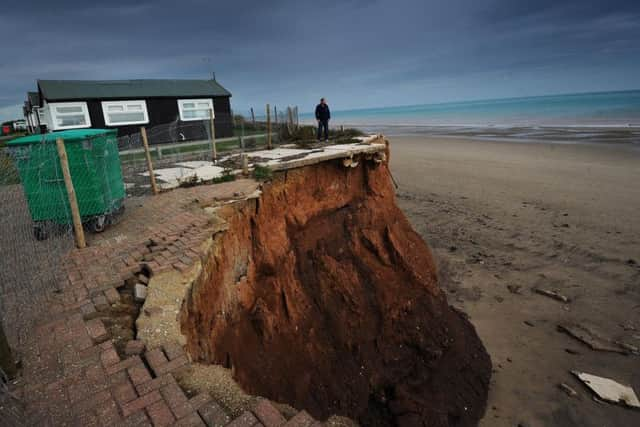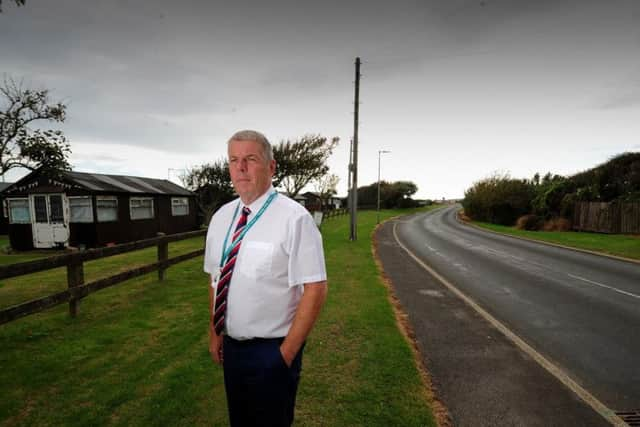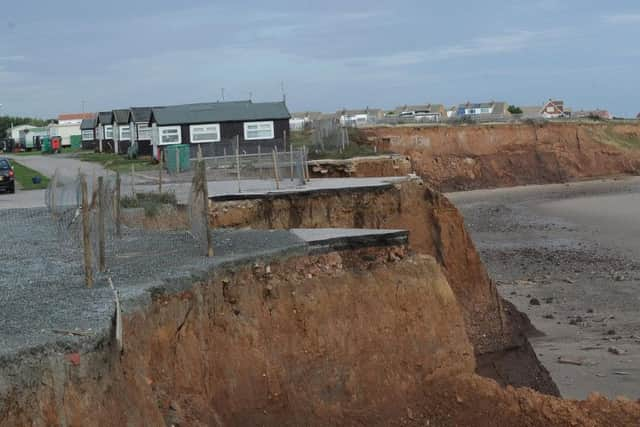Clifftop homes and road in Yorkshire threatened by coastal erosion saved by £3 million grant from Europe
Campaigners are celebrating after hearing that their "11th bid at the 12th hour" for money from European Regional Development Fund towards the £5.5 million scheme had been approved.
It should save hundreds of chalets as well as Newsham Gardens, a cul de sac to the west of Holmpton Road, and spare emergency vehicles travelling south and residents a long detour inland.
Advertisement
Hide AdAdvertisement
Hide AdWard councillor Dave Tucker said: "I'm shaking with excitement.


"We've lobbied Ministers, MPs, we've done everything we can. This is the 11th bid put in for this money and it has come in at the 12th hour.
"This £3m will secure the long term economy and the safety of south Withernsea. The road will be maintained and people will have access to chemists, doctors, groceries.
"If we'd lost that, it would be catastrophic.
"We have the planning permission, we have the money, let's get the rocks on the beach and get that road saved."


Advertisement
Hide AdAdvertisement
Hide AdThe hope now is that work installing rock armour will begin in the Spring.
East Riding Council said while funding has been secured and planning permission is now in place, there were still a number of hurdles to overcome.
Council officers will now have to obtain a Crown lease and work permit for the works and finalise the marine licence with the Marine Management Organisation.
They will also be working closely with local landowners to ensure relevant access permissions are agreed and local fishermen to ensure any disruption is minimised during rock delivery by sea.


Advertisement
Hide AdAdvertisement
Hide AdThe Holderness coastline has some of the fastest eroding coast in Europe with over four metres a year of land eroding at south Withernsea.
This scheme will extend the current defences with 400 metres of rock armour, to protect from the on-going coastal erosion in an undefended area.
The project includes a re-work of the existing 100metre rock terminal structure, regrading of the existing cliff line along a 400metre length and the creation of a new 100metre terminal structure at the end of the defences.
Councillor Chris Matthews, portfolio holder for strategic management at East Riding of Yorkshire Council, said: “Whilst this is good news that the council has secured the funding and planning permission for the scheme, there are still a number of obstacles that we have to overcome before work on this complex project can actually get underway.
Advertisement
Hide AdAdvertisement
Hide Ad“Should we overcome these final hurdles it is expected work could begin in spring 2020.”
It has been more than a century and a half since a village was last lost in Holderness.
Kilnsea was considered “the prettiest village in all Holderness, standing on a hill with a wide prospect over sea and land, a noble old church, pleasant gardens sloping down the hillside and a fine spring of bright water surrounded by willows”.
But faced with the encroaching sea and the erosion of the soft boulder clay on which their cobble and thatch houses were built, in 1850 the residents abandoned the land for a new village further inland.
Some two dozen settlements have been lost to coastal erosion since Roman times, including the evocatively-named Ravenspurn, Monkwike and Waxholme.